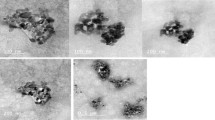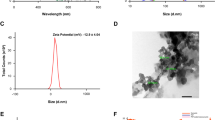Abstract
Oral cancer, a disfiguring and life threatening cancer, significantly affects the day-to-day life of not only the patients but also their family members in terms of life quality and financial burden. India records higher incidence of oral cancer every year and is mainly due to the habituation of tobacco products and alcohol abuse. Delay in diagnosis and treatment influences India’s higher incidence of oral cancer, where annually 50,000–60,000 oral carcinoma cases are reported. 7,12-dimethylbenz(a)anthracene (DMBA)-induced cancer in the oral cavity mimics human oral cancer in histopathological, molecular, and morphological aspects, and thus, by using this paradigm, the tumor inhibiting efficacy of medicinal plants or herbs and their components is scientifically validated. Ursolic acid, due to its multiple pharmacological effects, has been attracted, in recent years, for chemoprevention research program. Though, ursolic acid has been shown to have beneficial effects, its poor water solubility and bioavailability hinder to exert its 100% efficacy. Therefore, ursolic acid is encapsulated in either natural or synthetic polymers to enhance its therapeutic efficacy. Chitosan is one of the natural polymers that have been employed in the synthesis of nanoparticles to improve the drug efficacy. The present study has thus chosen ursolic acid–loaded chitosan nanoparticles (UACNP) to assess its anticancer efficacy in the DMBA-induced oral carcinoma. The anticancer efficacy of UACNP in experimental oral carcinogenesis was assessed by employing the status of oxidative markers and detoxification cascade as an end point. DMBA-induced abnormalities in the status of oxidative markers and detoxification cascade were reversed by ursolic acid–loaded chitosan nanoparticles. The tumor inhibiting or suppressing effect of UACNP is thus explored in experimental oral carcinogenesis.












Similar content being viewed by others
Data availability
All data generated or analyzed during this study are included in this article.
References
Beutler E, Kelly BM (1963) The effect of sodium nitrite on red cell GSH. Experientia 15(19):96–97. https://doi.org/10.1007/BF02148042
Brieger K, Schiavone S, Miller FJ Jr, Krause KH (2012) Reactive oxygen species: from health to disease. Swiss Med Wkly 142:w13659. https://doi.org/10.4414/smw.2012.13659
Calvo P, Remuñan-López C, Vila-Jato JL, Alonso MJ (1997) Chitosan and chitosan/ethylene oxide-propylene oxide block copolymer nanoparticles as novel carriers for proteins and vaccines. Pharm Res 14(10):1431–1436. https://doi.org/10.1023/a:1012128907225
Carlberg I, Mannervik B (1985) Glutathione reductase. Methods Enzymol 113:484–490. https://doi.org/10.1016/s0076-6879(85)13062-4
Checa J, Aran JM (2020) Reactive oxygen species: drivers of physiological and pathological processes. J Inflamm Res 13:1057–1073. https://doi.org/10.2147/JIR.S275595
Choromańska B, Myśliwiec P, Kozłowski T (2021) Antioxidant barrier and oxidative damage to proteins, lipids, and DNA/RNA in adrenal tumor patients. Oxid Med Cell Longey 2021:5543531. https://doi.org/10.1155/2021/5543531
Desai ID (1984) Vitamin E analysis methods for animal tissues. Methods Enzymol 105:138–147. https://doi.org/10.1016/s0076-6879(84)05019-9
Ernster L (1967) DT-diaphorase. In: Pullman ME, Estabrook RW (eds) Methods Enzymol. Academic Press, New York, pp 309–317
Guo JL, Han T, Bao L, Li XM, Ma JQ, Tang LP (2019) Ursolic acid promotes the apoptosis of cervical cancer cells by regulating endoplasmic reticulum stress. J Obstetgynaecol Res 45(4):877–881. https://doi.org/10.1111/jog.13919
Gupta B, Ariyawardana A, Johnson NW (2013) Oral cancer in India continues in epidemic proportions: evidence base and policy initiatives. Int Dent J 63(1):12–25. https://doi.org/10.1111/j.1875-595x.2012.00131.x
Habig WH, Pabst MJ, Jakoby WB (1974) Glutathione S-transferases. The first enzymatic step in mercapturic acid formation. J Biol Chem 249(22):7130–9
Jin H, Pi J, Yang F (2016) Ursolic acid-loaded chitosan nanoparticles induce potent anti-angiogenesis in tumor. Appl Microbial Biotecnol 100(15):6643–6652. https://doi.org/10.1007/s00253-016-7360-8
Kakkar P, Das B, Viswanathan PN (1984) A modified spectrophotometric assay of superoxide dismutase. Indian J BiochemBiophys 21(2):130–132
Kavitha K, Manoharan S (2006) Anticarcinogenic and antilipidperoxidative effects of Tephrosia purpurea (Linn.) Pers. in 7, 12-dimethylbenz(a)anthracene (DMBA) induced hamster buccal pouch carcinoma. Indian J Pharmacol 38:185–9. https://doi.org/10.4103/0253-7613.25805
Khan Z, Dreger S, Shah SMH (2017) Oral cancer via the bargain bin: The risk of oral cancer associated with a smokeless tobacco product (Naswar). PLoS One 12(7):e0180445. https://doi.org/10.1371/journal.pone.0180445
Lee YH, Wang E, Kumar N, Glickman RD (2014) Ursolic acid differentially modulates apoptosis in skin melanoma and retinal pigment epithelial cells exposed to UV-VIS broadband radiation. Apoptosis 19(5):816–828. https://doi.org/10.1007/s10495-013-0962-z
Lin W, Ye H (2020) Anticancer activity of ursolic acid on human ovarian cancer cells via ROS and MMP mediated apoptosis, cell cycle arrest and downregulation of PI3K/AKT pathway. J BUON 25(2):750–756
Luan M, Wang H, Wang J, Zhang X, Zhao F, Liu Z, Meng Q (2022) Advances in anti-inflammatory activity, mechanism and therapeutic application of ursolic acid. Mini Rev Med Chem 22(3):422–436. https://doi.org/10.2174/1389557521666210913113522
Manimaran A, Manoharan S (2018) Tumor preventive efficacy of Emodin in 7,12-dimethylbenz[a]anthracene-induced oral carcinogenesis: a histopathological and biochemical approach. Pathol Oncol Res 24(1):19–29. https://doi.org/10.1007/s12253-017-0205-7
Mohammed MA, Syeda JTM, Wasan KM, Wasan EK (2017) An overview of chitosan nanoparticles and its application in non-parenteral drug delivery. Pharmaceutics 9(4):53. https://doi.org/10.3390/pharmaceutics9040053
Neelakandan M, Manoharan S, Muralinaidu R, Thara JM (2023) Tumor preventive and antioxidant efficacy of chlorogenic acid-loaded chitosan nanoparticles in experimental skin carcinogenesis. Naunyn Schmiedebergs Arch Pharmacol 396(3):533–546. https://doi.org/10.1007/s00210-022-02330-3
Ohkawa H, Ohishi N, Yagi K (1979) Assay for lipid peroxides in animal tissues by thiobarbituric acid reaction. Anal Biochem 95(2):351–358. https://doi.org/10.1016/0003-2697(79)90738-3
Omaye ST, Turnbull JD, Sauberlich HE (1979) Selected methods for the determination of ascorbic acid in animal cells, tissues, and fluids. Methods Enzymol 62:3–11. https://doi.org/10.1016/0076-6879(79)62181-x
Omura T, Sato R (1964) The carbon monoxide-binding pigment of liver microsomes. I. Evidence for its hemoprotein nature. J Biol Chem 239:2370–8
Palan PR, Mikhail MS, Basu J, Romney SL (1991) Plasma levels of antioxidant beta-carotene and alpha-tocopherol in uterine cervix dysplasias and cancer. Nutr Cancer 15(1):13–20. https://doi.org/10.1080/01635589109514106
Panda SS, Thangaraju M, Lokeshwar BL (2022) Ursolic acid analogs as potential therapeutics for cancer. Molecules 27(24):8981. https://doi.org/10.3390/molecules27248981
Rajasekaran D, Manoharan S, Prabhakar MM, Manimaran A (2015) Enicostemma littorale prevents tumor formation in 7,12-dimethylbenz(a)anthracene-induced hamster buccal pouch carcinogenesis. Hum Exp Toxicol 34(9):911–921. https://doi.org/10.1177/0960327114562033
Renju GL, Manoharan S, Balakrishnan S, Senthil N (2007) Chemopreventive and antilipidperoxidative potential of Clerodendron inerme (L) Gaertn in 7,12-dimethylbenz(a)anthracene induced skin carcinogenesis in Swiss albino mice. Pak J Biol Sci 10(9):1465–1470. https://doi.org/10.3923/pjbs.2007.1465.1470
Robles-Planells C, Barrera-Avalos C, Rojo LE (2020) Chitosan-based delivery of avian reovirus fusogenic protein p10 gene: in vitro and in vivo studies towards a new vaccine against melanoma. Biomed Res Int 4045760. https://doi.org/10.1155/2020/4045760
Rotruck JT, Pope AL, Ganther HE, Swanson AB, Hafeman DG, Hoekstra WG (1973) Selenium: biochemical role as a component of glutathione peroxidase. Science 179(4073):588–590. https://doi.org/10.1126/science.179.4073.588
Ryan MJ, Dudash HJ, Docherty M (2010) Vitamin E and C supplementation reduces oxidative stress, improves antioxidant enzymes and positive muscle work in chronically loaded muscles of aged rats. ExpGerontol 45(11):882–895. https://doi.org/10.1016/j.exger.2010.08.002
Selvasundaram R, Manoharan S, Buddhan R, Neelakandan M, Murali NR (2018) Chemopreventive potential of esculetin in 7,12-dimethylbenz(a)anthracene-induced hamster buccal pouch carcinogenesis. Mol Cell Biochem 448(1–2):145–153. https://doi.org/10.1007/s11010-018-3321-0
Sinha AK (1972) Colorimetric assay of catalase. Anal Biochem 47(2):389–394. https://doi.org/10.1016/0003-2697(72)90132-7
Sun Y, Lu Y, Saredy J (2020) ROS systems are a new integrated network for sensing homeostasis and alarming stresses in organelle metabolic processes. Redox Biol 37:101696. https://doi.org/10.1016/j.redox.2020.101696
Sycz, Tichaczek-Goska D, Wojnicz D (2022) Anti-planktonic and anti-biofilm properties of pentacyclic triterpenes-asiatic acid and ursolic acid as promising antibacterial future pharmaceuticals. Biomolecules 12(1):98. https://doi.org/10.3390/biom12010098
Tang S, Fang C, Liu Y, Tang L, Xu Y (2022) Anti-obesity and anti-diabetic effect of ursolic acid against streptozotocin/high fat induced obese in diabetic rats. J Oleo Sci 71(2):289–300. https://doi.org/10.5650/jos.ess21258
Tietze F (1969) Enzymic method for quantitative determination of nanogram amounts of total and oxidized glutathione: applications to mammalian blood and other tissues. Anal Biochem 27(3):502–522. https://doi.org/10.1016/0003-2697(69)90064-5
Vo TTT, Chu PM, Tuan VP, Te JS, Lee IT (2020) The promising role of antioxidant phytochemicals in the prevention and treatment of periodontal disease via the inhibition of oxidative stress pathways: updated insights. Antoixidants (Basel) 9(12):1211. https://doi.org/10.3390/antiox9121211
Vonk J, de Wit JG, Voskuil FJ, Witjes MJH (2021) Improving oral cavity cancer diagnosis and treatment with fluorescence molecular imaging. Oral Dis 27(1):21–26. https://doi.org/10.1111/odi.13308
Yagi K (1987) Lipid peroxides and human diseases. ChemPhys Lipids 45(2–4):337–351. https://doi.org/10.1016/0009-3084(87)90071-5
Zahra KF, Lefter R, Ali A, Abdellah EC, Trus C, Ciobica A, Timofte D (2021) The involvement of the oxidative stress status in cancer pathology: a double view on the role of the antioxidants. Oxid Med Cell Longev 2021:9965916. https://doi.org/10.1155/2021/9965916
Zhang Q, Hou D, Wen X (2022) Gold nanomaterials for oral cancer diagnosis and therapy: advances, challenges, and prospects. Mater Today Bio 15:100333. https://doi.org/10.1016/j.mtbio.2022.100333
Zhao L, Duan X, Cao W (2021) Effects of different drying methods on the characterization, dissolution rate and antioxidant activity of ursolic acid-loaded chitosan nanoparticles. Foods 10(10):2470. https://doi.org/10.3390/foods10102470
Zmijewski JW, Landar A, Watanabe N, Dickinson DA, Noguchi N, Darley-Usmar VM (2005) Cell signalling by oxidized lipids and the role of reactive oxygen species in the endothelium. BiochemSoc Trans 33(Pt 6):1385–1389. https://doi.org/10.1042/BST0331385
Author information
Authors and Affiliations
Contributions
M. Karthik: Undertook the present research work. S. Manoharan: Designed the research plan and supervised the research work. R. Muralinaidu: Involved in histopathological studies and interpreted the histopathological findings. The authors declare that all data were generated in-house and that no paper mill was used.
Corresponding author
Ethics declarations
Ethical approval
All applicable international, national, and/or institutional guidelines for the care and use of animals were followed.
Consent to participate
Not applicable.
Consent for publication
Not applicable.
Competing interests
The authors declare no competing interests.
Additional information
Publisher's note
Springer Nature remains neutral with regard to jurisdictional claims in published maps and institutional affiliations.
Rights and permissions
Springer Nature or its licensor (e.g. a society or other partner) holds exclusive rights to this article under a publishing agreement with the author(s) or other rightsholder(s); author self-archiving of the accepted manuscript version of this article is solely governed by the terms of such publishing agreement and applicable law.
About this article
Cite this article
Karthik, M., Manoharan, S. & Muralinaidu, R. Ursolic acid–loaded chitosan nanoparticles suppress 7,12-dimethylbenz(a)anthracene-induced oral tumor formation through their antilipid peroxidative potential in golden Syrian hamsters. Naunyn-Schmiedeberg's Arch Pharmacol 396, 3061–3074 (2023). https://doi.org/10.1007/s00210-023-02509-2
Received:
Accepted:
Published:
Issue Date:
DOI: https://doi.org/10.1007/s00210-023-02509-2




